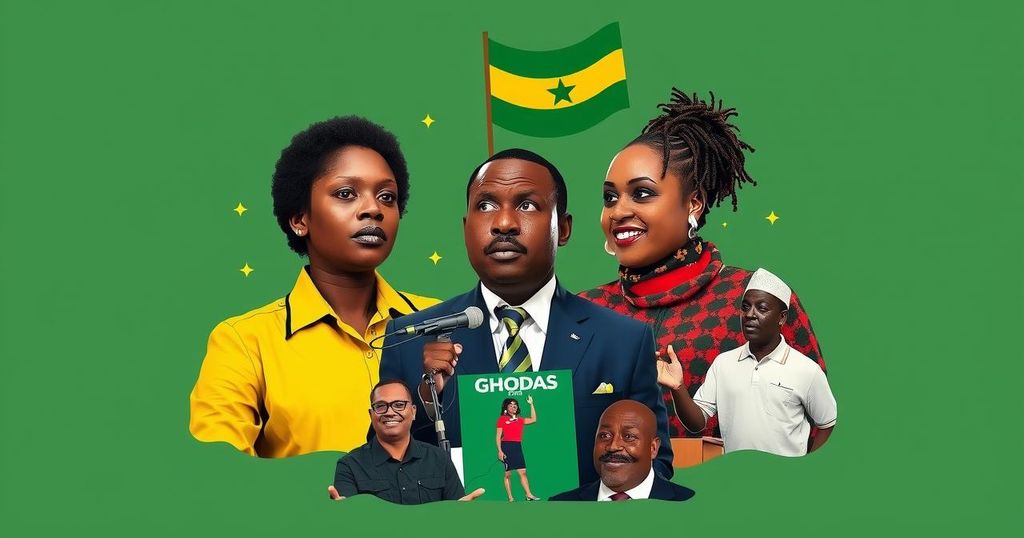Ghana’s Upcoming Elections: Candidates and Key Issues at Stake
Ghana is set to hold its general elections on December 7, concluding President Akufo-Addo’s term. Leading candidates are Mahamudu Bawumia (NPP) and John Mahama (NDC). Economic issues, including high inflation and unemployment, dominate the election landscape. Voters will select both a president and members of parliament, with the outcome poised to shape Ghana’s future amidst rising concerns over living costs and environmental impacts from mining.
Ghana is poised to hold its general election on December 7, with over 18.8 million voters eligible to participate. The elections coincide with the conclusion of President Nana Akufo-Addo’s term, presenting an opportunity for a new leader. The primary candidates in this race are Mahamudu Bawumia from the New Patriotic Party (NPP), who has served as the vice president, and John Mahama of the National Democratic Congress (NDC), a former president seeking to reclaim his position.
Bawumia, a 61-year-old economist educated at Oxford, aims to become Ghana’s first Muslim president but faces scrutiny due to the country’s economic strife during his tenure. Meanwhile, Mahama, at age 65, seeks a political revival after serving as president from 2012 to 2016 and has vowed to implement an “urgent reset” to address the nation’s economic challenges. Other noteworthy candidates include Nana Kwame Bediako, a businessman with a considerable social media presence, and Alan Kyerematen, a former minister who recently parted ways with the NPP.
Economic concerns are paramount among voters, particularly regarding inflation, which surged to 54% at the end of 2022, causing substantial financial strain for many Ghanaians. The World Bank estimates that approximately 850,000 citizens fell into poverty as a direct consequence of rising living costs. Additionally, unemployment, especially among the youth, and the adverse effects of illegal gold mining have emerged as critical issues in the election discourse.
The voting process is structured, with a dual election format: voters will select both a president, where a candidate must secure more than half of the votes to win outright, and parliamentarians in numerous constituencies based on a first-past-the-post system. Past elections have demonstrated Ghana’s commitment to a peaceful electoral process, though they have not been without contention, including disputes over vote counting in previous years.
Results are expected to be announced by December 10, following a timeline established in past electoral cycles. The outcome will significantly shape the political landscape and address the pressing issues threatening the country’s socio-economic environment.
The upcoming election in Ghana marks a pivotal moment as the nation prepares to select a new president, concluding Nana Akufo-Addo’s leadership. Multiparty politics have been a hallmark of the Ghanaian political landscape since the early 1990s, fostering a history of competitive yet peaceful elections. The NPP and NDC have traditionally dominated this arena, creating a dichotomy of choices for Ghanaians. This election is particularly significant as it addresses pressing economic challenges, rising inflation, and social issues further inflamed by the COVID-19 pandemic’s aftereffects. Understanding these dynamics is crucial for grasping the stakes and implications of the electoral process forthcoming in December.
The forthcoming elections in Ghana are crucial, with Mahamudu Bawumia and John Mahama emerging as the leading candidates amid a backdrop of significant economic challenges and social issues. Voters face not only the choice of their next president but also a mandate on how to best navigate the current financial crisis, rising inflation, and environmental concerns. The elections promise to uphold Ghana’s democratic traditions while addressing pressing national matters. The results, anticipated shortly after the election, will signal the public’s response to these pressing challenges and the future direction of the nation.
Original Source: www.bbc.co.uk




Post Comment